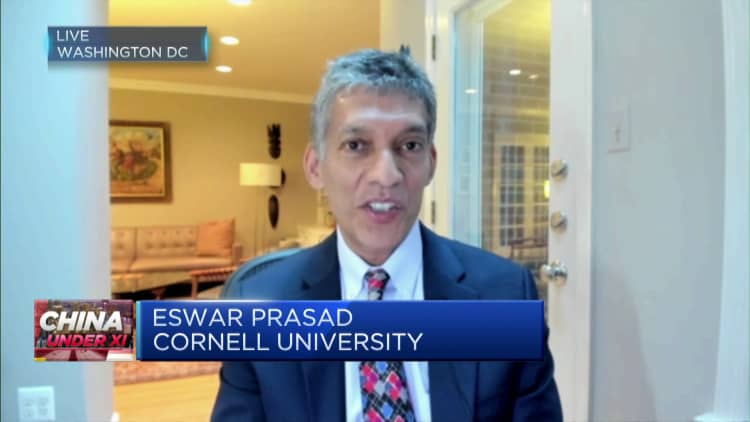[ad_1]

China will continue to work toward becoming more self-reliant, but don’t expect President Xi Jinping to move on Taiwan by force, analysts said.
Their comments follow Xi’s speech at the opening of the Chinese communist party’s national congress on Sunday.
There were little surprises in Xi’s nearly two-hour speech where he outlined his vision for the country for the next five years, analysts said. Xi is widely expected to cement his leadership for an unprecedented third term during the week-long meeting.
There was, however, a key standout in Xi’s speech, said Dylan Loh, a professor in foreign policy and China expert at Singapore’s Nanyang Technological University. Unlike previous speeches, Xi made clear China had to brace itself for growing external challenges, Loh said.
Additionally, the Chinese leader’s call for the party to “build a socialist modern power by 2049” indicates “his determination to resist external pressures and steer China on the party’s own course,” said political risk consultancy, Eurasia Group.
Self-reliance
The importance of self-reliance was reinforced after Xi re-articulated the so-called “dual circulation” policy, Eswar Prasad, professor of international trade and economics at Cornell University told CNBC’s “Squawk Box Asia” on Monday.
The dual circulation strategy first emerged in 2020 when a Chinese Politburo meeting called for more focus on domestic markets, or “internal circulation” to support China’s growth. The strategy involves placing less reliance on export-based or trade-related growth without abandoning it altogether.
In a nearly two-hour speech, Chinese President Xi Jinping outlined his vision for the country for the next five years. The Chinese leader is widely expected to cement his leadership for an unprecedented third term during the week-long meeting.
Lintao Zhang | Getty Images News
“Certainly, Chinese leaders have been taking very careful note of what has been happening in the Ukraine war and what sort of chokehold the west has been able to put on Russia and of course, there is a sense of great power competition between the U.S. and China as well,” Prasad said.
“So this notion of self-reliance, especially in the context of technology … trying to become less dependent on the rest of the world, either for export markets or for technology or imports of any sort. That is clearly going to be a key pillar.”
Xi Jinping has made very clear what his intentions are: he wants a private sector that is controllable, that is manageable.
Eswar Prasad
Professor of International Trade & Economics, Cornell University
To get there, Prasad said Beijing’s control of China’s private sector would ramp up instead of heading toward the other end of the spectrum, that is, to allow for more market-oriented reforms.
He said Xi’s speech, consistent with Beijing’s comments in recent months, suggested the government viewed a more state-dominated economy as the pathway to stability.
“Xi Jinping has made very clear what his intentions are: he wants a private sector that is controllable, that is manageable.”
That strategy is well underway given Beijing’s intervention in the past with China’s educational and property sectors.

As such, there would likely be a reshuffle in Xi’s cabinet by the end of this week’s meeting, including possible changes at the People’s Bank of China, in addition to an expected replacement for Premier Li Keqiang who is due to retire in March, Prasad said.
But it wouldn’t matter who the new premier or cabinet members are as Xi has made it clear he will be pulling all the strings, according to Prasad.
China-Taiwan tensions
Other observers such as Bilahari Kausikan, former permanent secretary at Singapore’s Ministry of Foreign Affairs, said Xi is not be keen to take Taiwan by force, even though he said in his speech that China “will never promise to renounce the use of force.”
China sees self-ruled Taiwan as part of its territory and tensions between the two were inflamed recently when U.S. House Speaker Nancy Pelosi’s visited the island in August despite warnings from Beijing.
“I really don’t think that the Chinese are very eager to start something to reunify Taiwan by force … because if you start that you must win,” Kausikan said.
“I don’t think any Chinese leader can survive a bungled attempt on Taiwan as Putin bungled Ukraine. And I don’t believe they have the capability yet.”
Lyle J. Morris, a senior fellow for foreign policy and national security at Asia Society Policy Institute’s Center for China Analysis, agreed.
“Xi is not signaling to the international community that he wants to invade Taiwan or that he’s running out of patience for political reconciliation,” he said pointing out that peaceful reunification was still the operative phrase Xi used.
“He did reference external forces very early on in the speech, so clearly the factor of the US is front and center in his mind.
Sticking to China’s zero-Covid policy
Asked if he was surprised Xi stayed firm on China’s zero-Covid policies to the despair of businesses that are hoping the country will reopen, Bilahari said Xi was driven by party and political logic which are secondary to economic logic.
“To abruptly abandon it would be to admit that it was a mistake … it will be unwound gradually over the next year or two without ever admitting that it has failed,” Bilahari told CNBC.
Loh from Singapore’s NTU said that sticking to zero-Covid policies had other practicalities. The Chinese medical infrastructure needs to be reformed before it can cope with a higher number of infections.
“The easiest, quickest and in some ways, surest, method to prevent deaths from Covid from spiralling out of control is the zero-Covid policy. I do expect some tweaks at the implementation level but probably nothing beyond,” he said.
[ad_2]
